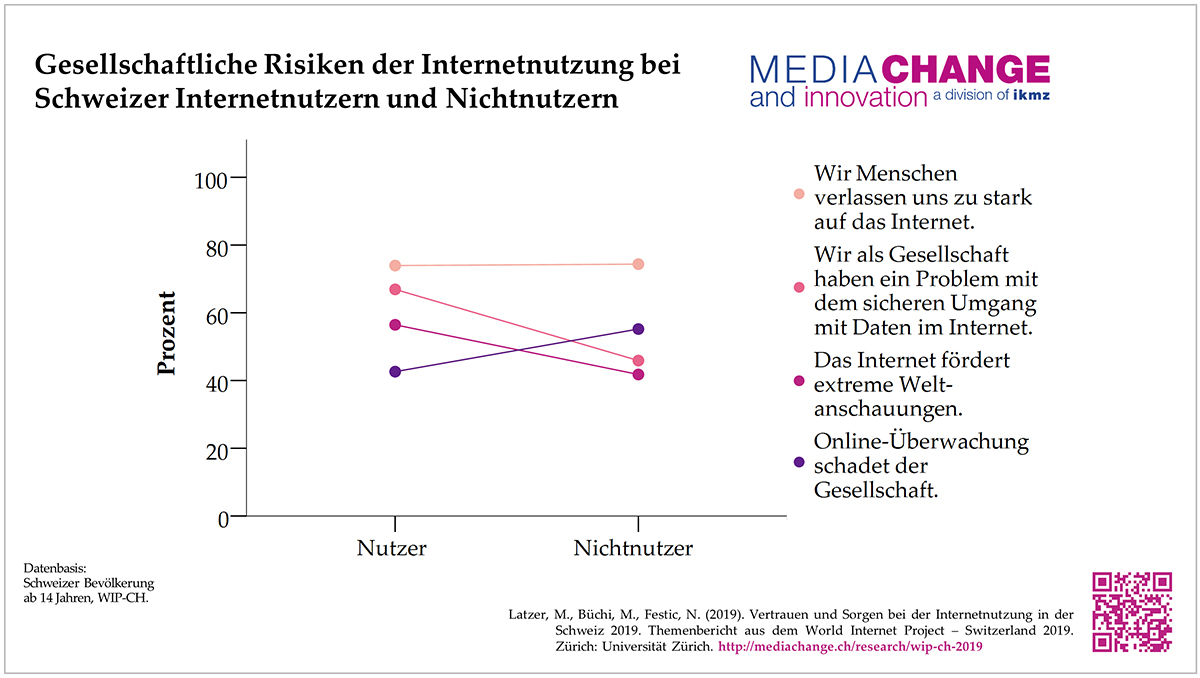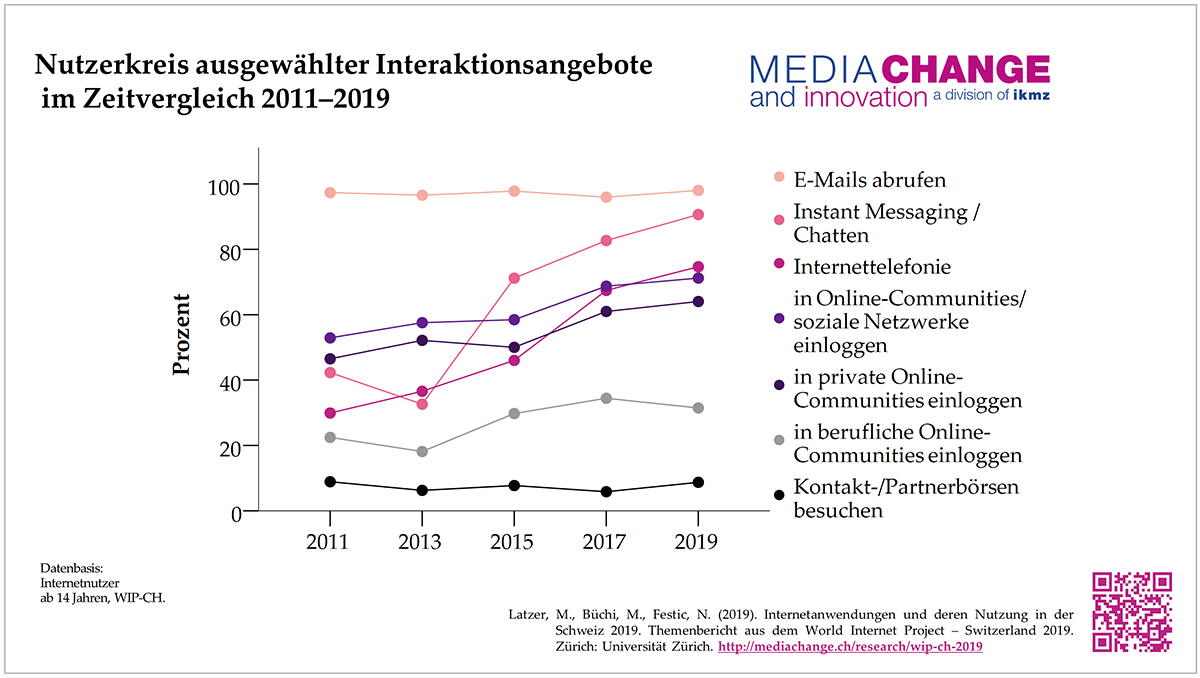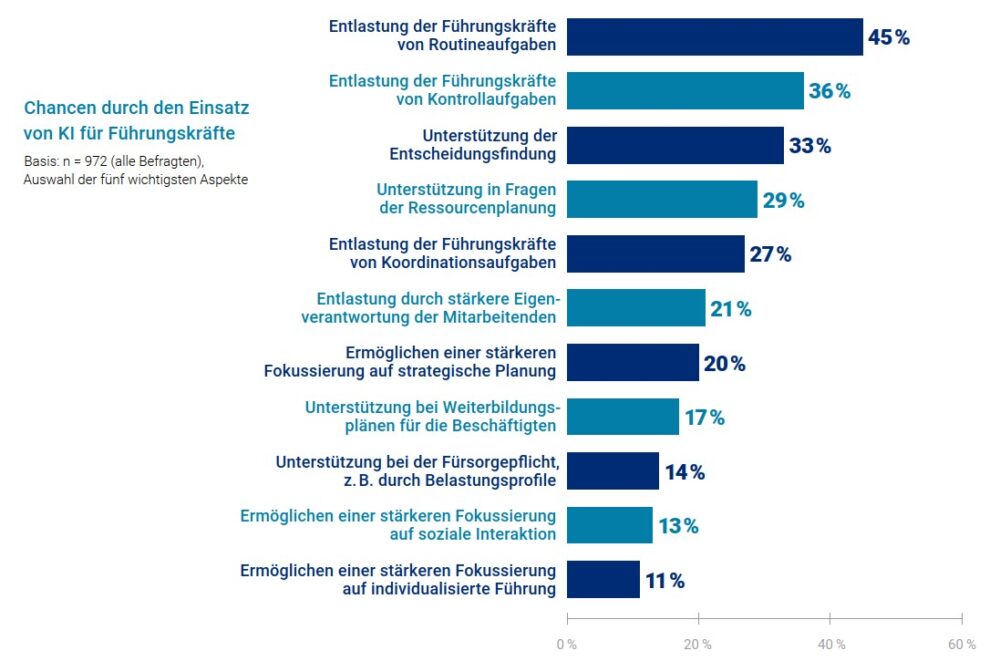Suspected Internet surveillance leads to self-censorship
More than half of Internet users in Switzerland are deterred from freely seeking information or expressing opinions online because they suspect surveillance. This is shown by a representative survey conducted by the University of Zurich on Internet use in Switzerland.

Anyone who does research using search engines or expresses their opinions on Facebook and WhatsApp leaves behind numerous digital traces. Internet users have the feeling that these traces are used for surveillance purposes.
According to the study by the University of Zurich UZH, 43 percent of the 1,122 people surveyed believe that online surveillance harms society. In addition, a large proportion of Swiss Internet users (45 percent) are concerned that companies like Facebook violate their privacy online.

One consequence of this is that Internet users restrict themselves online: more than half say that possible surveillance deters them from freely seeking information (59 percent) - such as researching sensitive political content - or from expressing opinions, interests or feelings (56 percent).
"Deterrent effects based on a sense of surveillance are questionable in terms of democratic policy," emphasizes Michael Latzer, Professor of Media Change & Innovation at the University of Zurich. "They threaten the exercise of fundamental rights and social participation via the Internet."
Eight out of ten Swiss use the Internet on the move
Dhe survey, conducted for the fifth time by Michael Latzer and his team, shows that even more Swiss people will be online in 2019 than in 2017. 92 percent of the Swiss population use the Internet today, and among those under 50, the figure is almost 100 percent. 80 percent of the total population are also online on the move.

Average usage time has doubled since 2011 and is now 25 hours per week. However, 40 percent of offliners benefit indirectly from the Internet by letting others do research or tasks for them. The number of non-users has been more than halved in the last eight years.
The number of absolute non-users (excluding proxy users) in Switzerland is therefore around 340,000. On average, people's Internet skills have been rated relatively equally since 2011. Women rate their Internet skills worse than men.

Internet most important media source of information and entertainment
The internet is the most important source of media information in Switzerland in 2019, followed by newspapers and television. It is now also in first place for entertainment purposes, ahead of television. One exception is the 70+ age group, for whom newspapers and radio are still more important.

Digital overconsumption and pressure of expectations
Digital overconsumption manifests itself, among other things, in the fact that around a quarter (26 percent) of Internet users believe they lose time for more important things through Internet use. 24 percent report spending more time online than they would actually like. 38 percent of Internet users in Switzerland feel that their private environment expects them to respond quickly to messages. In the professional environment, around three quarters of users (73 percent) feel this way.
The digital pressure of expectations in terms of availability and skills is perceived as stronger specifically by the young and highly educated. "With an overall high level of digital well-being in Switzerland, the young feel significantly more frequently affected by overconsumption and pressure of expectations," Michael Latzer sums up. "However, the young also take countermeasures most frequently, such as specifically switching off notifications on the smartphone, which is not least related to digital literacy." 59 percent of users feel integrated into the information society, compared with only 22 percent of non-users.

One in three Swiss sells online
87 percent of Swiss Internet users search online for product information. 82 percent make purchases online, with travel bookings (71 percent) being particularly popular. More than a third (36 percent) also sell online themselves. Sharing economy services such as Uber and Airbnb have grown significantly compared to 2017 and are used by 28 percent; 16 percent also actively offer such services themselves. The use of online social networks has increased sharply since 2011 (53 percent) (2019: 71 percent). Currently, the majority (69 percent) use them daily or several times a day.
Younger people in particular make very heavy use of such networks: 99 percent of 14- to 19-year-olds and 87 percent of 20- to 29-year-olds are on social networks. Around 7 out of 10 Internet users (72 percent) download music from the Internet or listen to music online. Services such as YouTube (51 percent) and Spotify (35 percent) are used most frequently for this purpose. Two-thirds of Swiss Internet users (66 percent) say they watch or download videos online. The most frequently used services here are YouTube (63 percent) and Netflix (42 percent).

Trust in content decreases - A lot of fact-checking
Around 6 out of 10 Swiss Internet users (63 percent) consider at least half of all Internet content to be credible. A year-on-year comparison shows a clear decline in the assessment of the trustworthiness of Internet content since 2013. Websites of the government and authorities, the SRG and paid newspapers are assessed as predominantly trustworthy. Less trust is placed in the pages of free newspapers and content on social networks. The proportion of people who check facts on the internet rose sharply between 2013 and 2017 and is 71 percent this year.
Skepticism about digital democratization and e-voting
Overall, the Swiss population does not believe that the Internet will further improve the democratic quality of the Swiss political system. Only a minority in each case believe that citizens can have more say (21 percent) and more power (27 percent) as a result of Internet use, that they understand politics better (39 percent), or that administration and politics take what they think more seriously (27 percent).
Nevertheless, a year-on-year comparison shows a trend toward increasing confidence in digital democratization. Half of the Swiss population (51 percent) would welcome an electronic election or voting option, although people aged 70 and over are significantly more skeptical about e-voting than younger people. "The much-discussed security shortcomings of previous e-voting systems are having an impact, but there is potential here to increase the low voter turnout among the young," says Michael Latzer. (pd)
The World Internet Project (WIP) is a comparative long-term study. It records the spread and use of the Internet in 30 countries in an international comparison and analyzes the social, political and economic implications of network development.
The WIP-CH project has been conducted by the Media Change & Innovation department of the Institute of Communication Studies and Media Research (IKMZ) at the University of Zurich under the direction of Professor Michael Latzer since 2011. It is based on a representative telephone survey of 1,122 people aged 14 and older conducted by Demoscope in May/June 2019. Members of the 2019 project team are Moritz Büchi and Noemi Festic.








